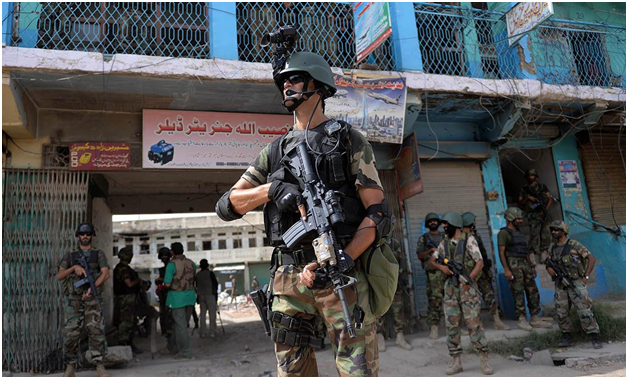Pakistan Finally Gets a U.S Nod of Approval For OPS Zarb-e-Azb
Pakistan Army's Operation Zarb-e-Azb

NEW DELHI: A few days after a Pentagon report implicated Pakistan for promoting terrorism in Afghanistan, a top United States General in command of the international forces in Afghanistan has said that Pakistan’s military offensive in North Waziristan, Operation Zarb-e-Azb, has been effective in rooting out terrorism in the region.
Lt. Gen. Joseph Anderson said in a Pentagon hosted video briefing, “They [the Haqqani network] are fractured. They are fractured like the Taliban is. That's based pretty much on the Pakistan [operations] and North Waziristan this entire summer-fall,” adding “that has very much disrupted their efforts [in Afghanistan] and has caused them to be less effective in terms of their ability to pull off an attack here in Kabul.”
The comment comes shortly after a Pentagon report that assessed the situation in Afghanistan implicated Pakistan for bolstering insurgency in the region. “The resiliency of the Afghan insurgency continues to depend on sanctuary in Pakistan, making an effective relationship between Afghanistan and Pakistan critical to long-term stability in the region. Both countries’ leaders have expressed interest in a stronger military-to-military relationship in the post-Karzai era, and Pakistan maintains a public commitment to supporting Afghan-led reconciliation. Nonetheless, Afghan-focused militants continue to operate from Pakistan territory to the detriment of Afghan and regional stability,” the report, titled “Progress Toward Security and Stability in Afghanistan” stated.
Pakistan responded sharply to the report, with Foreign Ministry spokesperson Tasnim Aslam rejecting the allegations as “utterly baseless” and “unsubstantiated.” Aslam also referred to the military operation in Afghanistan, saying, “We are in the midst of a very comprehensive law enforcement [army] operation against terrorists, known as Zarb-e-Azb. We have repeatedly said that we are not making any distinction in our operations against terrorists no matter to which organization they may belong.”
Aslam, in turn, accused the US and Afghan security forces for not effectively guarding their side of the border against militant movements. Saying that Pakistan had looked for Afghanistan’s cooperation before starting the military offensive, Aslam added, “...he unfortunate fact that we did not receive the cooperation that we expected, which would have been in the interest of not just peace and stability in Pakistan but also in Afghanistan. Despite that background, this kind of baseless allegation in a report to the U.S. Congress is unacceptable to Pakistan.”
Although Pakistan and Afghanistan signed a cross border agreement to monitor the border after the military offensive was launched, the process itself was fraught with tensions, with then-Afghan President Hamid Karzai demanding that Pakistan meet a series of conditions as a prerequisite for his cooperation.
In a letter handed over to Pakistani Prime Minister Nawaz Sharif by Karzai’s top security advisor during a one day visit to Islamabad, the former Afghan President stated outlined the following conditions: “(1) all terrorists are targeted without discrimination, (2) civilians are not harmed in the fight against terror, (3) Pakistan releases all detained Afghan Taliban leaders who support peace in Afghanistan, (4) all terrorist hideouts and support centres are eliminated, (5) Pakistan stops artillery shelling on Afghan territory, (6) Pakistan and Afghanistan coordinate their anti-terrorism efforts with important regional nations like India and China, (7) there should be a roadmap for bilateral coordination and contact to take the war on terror forward.”
The letter came a few days after tensions rose between the two countries following an allegation that linked the killing of three soldiers and eight civilians in Dangam district, eastern Kunar province, to Pakistani soldiers. Afghan Foreign Ministry spokesperson Ahmad Shakib Mustaghni had said that “Pakistani forces, wearing civilian clothes, carried out the attack” in Dangam district.
Pakistan’s Foreign Ministry issued a statement in response, rejecting the allegations and asking the “Afghan government to refrain from taking any action that may be detrimental to peace and stability on the border.”
These tensions, although exacerbated recently, are not new. Afghan officials have long blamed Pakistan’s Inter Service Intelligence Agency (ISI) for nurturing and supporting militancy across the border. Quoted in the Washington Post a few weeks ago, Afghan interior minister at the time, Mohammad Umer Daudzai, explained the rationale behind this suspicion when he said, “We know they [Pakistan] have not given up their dream of controlling Afghanistan. They want Afghanistan to be their satellite.”
Pakistan points out that they too are suffering from the same terrorist acts on their own soil. In the same article in the Post, Gen. Asim Bajwa, a spokesman for the Pakistani military said, “We have made it very clear that Pakistan is determined to eliminate all terrorists and sanctuaries from Pakistan and is also committed to ensure that our soil is never used for any terrorist activity abroad.”



